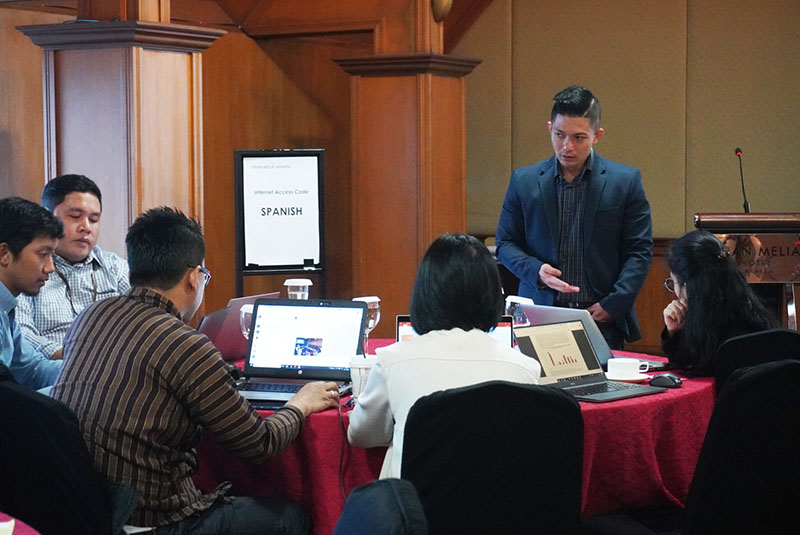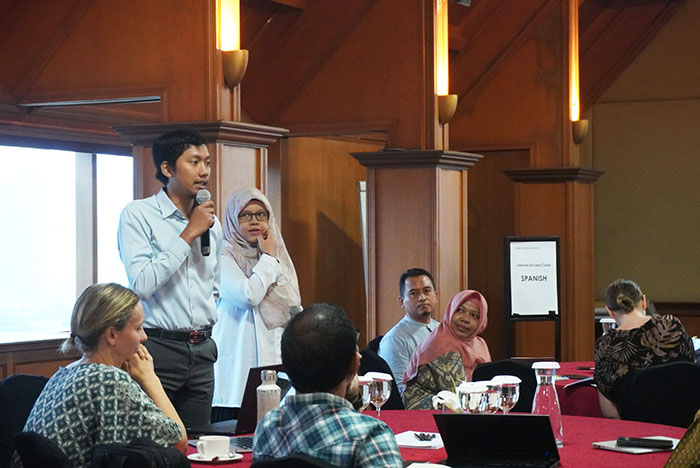[vc_row css=”.vc_custom_1565542682041{margin-right: 0px !important;margin-left: 0px !important;}”][vc_column css=”.vc_custom_1565542696462{padding-right: 0px !important;padding-left: 0px !important;}”][vc_single_image image=”4713″ img_size=”1440×300″ el_class=”banner-event”][/vc_column][/vc_row][vc_row css=”.vc_custom_1565542751414{margin-right: 0px !important;margin-left: 0px !important;}”][vc_column width=”1/4″][/vc_column][vc_column width=”1/2″ css=”.vc_custom_1565622195563{padding-bottom: 50px !important;}”][vc_column_text el_class=”title-event”][post_title][/vc_column_text][vc_column_text el_class=”date-venue-news”]Jakarta, 13-15 January 2020
[/vc_column_text][vc_column_text el_class=”text-par-news”]Paris Agreement Article 9 talks about financial support for climate change mitigation and adaptation activities. Green Climate Fund (GCF) is a part of the Financial Mechanism of UNFCCC. It funds projects with potential impacts of carbon emission reductions (mitigation) or improved resilience (adaptation).
GCF works through the National Designated Authority (NDA) in each developing country. Some examples of NDA are the Ministry of Finance (Indonesia), Ministry of Planning and Investment (Vietnam), Ministry of Energy, Science, Technology, Environment and Climate Change (Malaysia), and Climate Change Commission (the Philippines).
GCF also provides Readiness Program, which aims to enhance country ownership and access to GCF. For example, the Global Green Growth Institute (GGGI) is currently implementing such a program for Indonesia, in tandem with Indonesian NDA. The main goal of the program is to boost climate finance accessed by the country.
ASEAN Centre for Energy (ACE) was invited to the GCF Concept Note Writing Workshop, which is a part of the Readiness Program. It was held in Gran Melia Hotel, Jakarta, 13-15 January 2020. Representing ACE was Senior Research Analyst of ACCEPT, Dr. Zulfikar Yurnaidi, and a consulting partner, Dr. Verena Streitfredt.
At this chance, ACE developed a project concept note related to de-risking energy efficiency investment in the industry sector. The purpose of the three days’ workshop—led by UK-based consultant Eco—was to improve the quality of the concept note, starting with improving the understanding of GCF and its appetite. This was translated into discussions on, among others, GCF pipeline, investment criteria, and financing trend, including co-finance.
The workshop then reviewed the concept note template and its key elements. Although it did not delve deeply into writing details, it introduced some concepts to assist the project proponent on structuring the project ideas, putting logic and storyline into it. These include problem tree and objective tree analysis, theory of change, and results framework. Also included were some practical discussions on climate rationale and general budgeting.
 Workshop participants discussing logical framework for concept note development
Workshop participants discussing logical framework for concept note development
Attended by representatives from 25 institutions of varied sectors, including theMinistry of Industry, CIFOR, EDF, Swisscontact, and WWF Indonesia, the workshop is to be followed up with AE (Accredited Entity) matchmaking. Accredited Entities are the implementing partners of GCF. The main target of the program is to submit high quality concept notes to GCF by June 2020.
Currently, climate finance is still under-tapped by the ASEAN Member States, even though this financial mechanism can complement the international development finance. As a key contributor to GHG emissions, energy sectors can potentially benefit from it. Readiness program, if available, should be utilized to its full potential to prepare key actors to tap such funds.
 Senior Research Analyst of ACCEPT exploring energy-climate finance through GCF
Senior Research Analyst of ACCEPT exploring energy-climate finance through GCF
As ACCEPT aims to improve the coherence between energy and climate policies of ASEAN, climate finance can be viewed as a bridging mechanism between the two. At the same time, it will contribute to more climate-friendly development of the energy sector. Through this engagement with GCF—the financial mechanism of UNFCCC—ACE increases its visibility in the climate change arena, both nationally and internationally.[/vc_column_text][vc_column_text el_class=”photo-caption-news”](ZY)[/vc_column_text][vc_tweetmeme][/vc_column][vc_column width=”1/4″][/vc_column][/vc_row]











